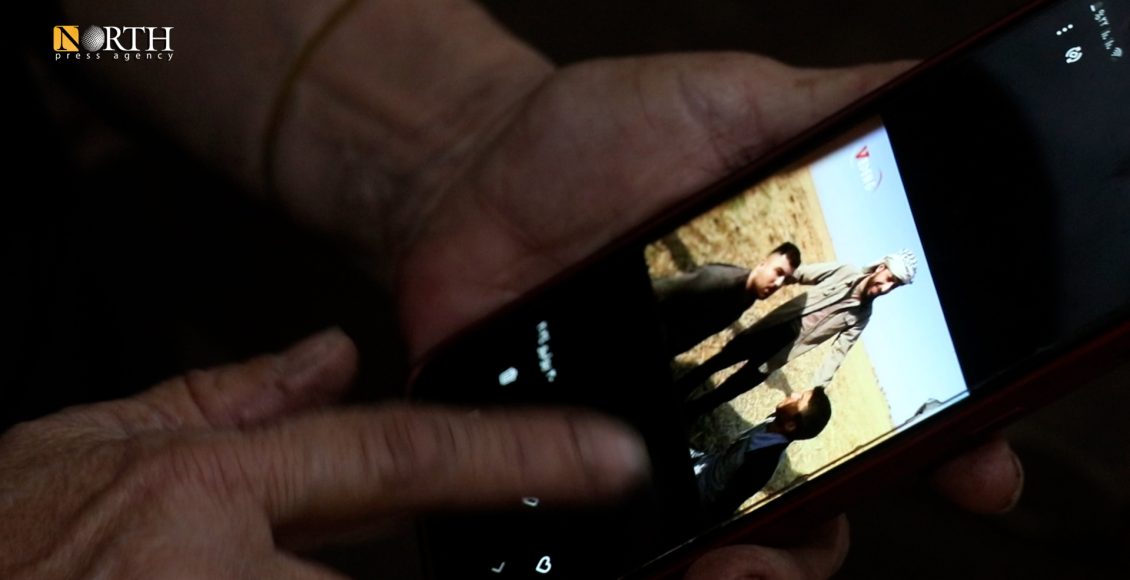Outrage as sanctioned warlord appointed Syrian military leader
By Nalin Ali
QAMISHLI, Syria (North Press) – On Oct. 12, 2019, Sanaa Awad lost contact with her only son, Mohammad Alaa Ibrahim, following the takeover of the Sere Kaniye (Ras al-Ain) region in the northern countryside of Hassakeh, northeastern Syria, by Turkish-backed Syrian armed factions.
The incident occurred during a major military offensive dubbed “Peace Spring Operation” launched by Turkey and its affiliated Syrian factions, known as the Syrian National Army (SNA), on Oct. 9, 2019, targeting the two cities of Sere Kaniye and Tel Abyad. The operation involved ground and air assaults and resulted in the occupation of the areas after clashes with the Syrian Democratic Forces (SDF), following the partial withdrawal of U.S. troops.
Civilian abductions
Speaking to North Press, Sanaa Awad said that her 25-year-old son, who worked as a driver and nurse, disappeared while transporting medical supplies. He was en route to the city of Manbij in the north of Aleppo when Turkish-backed SNA gained control of the M4 Highway, where he was last seen.
Awad believes her son was abducted by members of the Ahrar al-Sharqiya faction—the same day and location where Kurdish female politician Hevrin Khalaf was assassinated. She emphasized that her son was a civilian with no military affiliations.
According to Awad, her son was captured by Ahrar al-Sharqiya, a faction led by Ahmad al-Hayes (also known as Abu Hatem Shaqra), who was recently appointed as commander of the Division 86 under the Syrian transitional government’s Ministry of Defense.
Awad stated she was allowed one brief visit to her son about six weeks after his abduction, at a detention site in Suluk, north of Raqqa, under Turkish occupation. Since then, she has had no information about his whereabouts. Despite the years that have passed, she continues to travel to Suluk every few months, clinging to hope. She recounted that her son is still held in the faction’s security building and is referred to by the name “Alaa the Nurse.” However, she said she is repeatedly misled—sometimes being told he was transferred to Turkish prisons, other times that he was handed over to military police.
The ordeal deeply affected the family. Mohammad’s father, Saad Ibrahim, passed away after a long battle with spleen cancer, worsened by the emotional toll of his son’s disappearance.
Mohammad Alaa was not the only one abducted that day. Another civilian, Azad Othman, was also kidnapped by Ahrar al-Sharqiya. At the time, images circulated on pro-Turkish SNA media outlets showed Abu Shaqra holding both men in custody.
Widespread condemnation of the appointment
Azad Othman’s father, Abdulkarim Othman, described Abu Shaqra’s appointment as “unacceptable.” Sanaa Awad called it “shocking.” Both parents appealed to the Transitional President Ahmad al-Sharaa to disclose the fate of their sons and all those detained in the faction’s prisons.
Abdulkarim Othman clarified that his son was arrested at the Tarwaziyah checkpoint in Sere Kaniye countryside and was never affiliated with Kurdish politician Hevrin Khalaf, despite false media claims. He urged the transitional government of Damascus to act transparently and to deliver justice, stating that without accountability, “the Syrian people will not accept this leadership.”
Ahmad al-Hayes (Abu Hatem Shaqra) was sanctioned by the U.S. Department of the Treasury in 2021 for his involvement in serious human rights violations. The sanctions cite his role in the assassination of the Kurdish politician Hevrin Khalaf, the execution of detainees in the faction’s Aleppo prison, and his alleged involvement in the trafficking of Yazidi women and children. Reports also indicate that he integrated former ISIS members into Ahrar al-Sharqiya, some of whom pledged allegiance to him and participated in ransom and extortion operations.
Reactions from Kurdish and human rights groups
Ruksan Mohammed, spokesperson for the Women’s Protection Units (YPJ), strongly denounced the appointment of Ahmad al-Hayes by the Syrian transitional government as commander of a military division in eastern Syria.
“We strongly condemn the appointment of Hatem Abu Shaqra—who is implicated in crimes against women, the Yazidi community, and in the assassination of our comrade Hevrin Khalaf and her driver Farhad Ramadan—as commander of the so-called Division 86,” she said.
Farhad Shami, head of the Media Center of the Syrian Democratic Forces (SDF), also denounced the decision saying, “The criminal Abu Hatem Shaqra, responsible for the assassination of Hevrin Khalaf and other crimes, belongs behind bars—not in official institutions.”
The decision to appoint Abu Shaqra was also condemned by the Autonomous Administration of North and East Syria (AANES), women’s organizations, and human rights groups, who described it as a grave step backward for justice and accountability in Syria.

